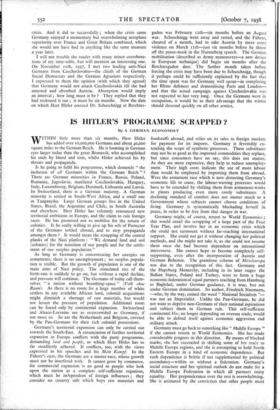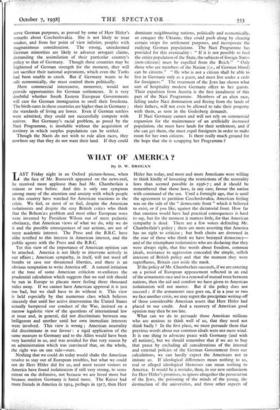IS HITLER'S PROGRAMME SCRAPPED ?
By A GERMAN ECONOMIST
WITHIN little more than six months, Herr Hitler has added over ro,000,000 Germans and about 40,000 square miles to the German Reich. He is looming in German eyes larger today than the great Bismarck, who accomplished his ends by blood and iron, whilst Hitler achieved his by threats and propaganda.
Is he going to fulfil his programme, which demands " the inclusion of all Germans within the German Reich " ? There are German minorities in France, Russia, Poland, Rumania, Jugoslavia, mutilated Czechoslovakia, Hungary, Italy, Luxembourg, Belgium, Denmark, Lithuania and Latvia. In Switzerland, therc is a German majority. A German minority is settled in South-West Africa, and a small one in Tanganyika. Large German groups live in the United States, Brazil, the Argentine and Chile, in South Australia and elsewhere. Herr Hitler has solemnly renounced new territorial ambitions in Europe, and the claim to rule foreign races. He has promised not to mobilise for the return of colonies. Is he really willing to give up his role of Protector of the Germans settled abroad, and to stop propaganda amongst them ? It would mean the scrapping of the central planks of the Nazi platform : " We demand land and soil (colonies) for the nutrition of our people and for the settle- ment of our surplus population."
As long as Germany is concentrating her energies on armaments, there is no unemployment ; no surplus popula- tion is visible. But the growth of population is one of the main aims of Nazi policy. The stimulated rise of the birth-rate is unlikely to go on, but without a rapid decline, and pressure will continue. The Germans of today call them- selves " a nation without breathing-space " (Volk ohne Raum). As there is no room for a large number of white settlers in any available African land, colonial acquisitions might diminish a shortage of raw materials, but would not lessen the pressure of population. Additional room can be found only by continental expansion. Switzerland and Alsace-Lorraine are as overcrowded as Germany, if not more so. So are the Netherlands and Belgium, coveted by the Pan-Germans for their rich colonial possessions.
Germany's territorial expansion can only be carried out towards the South-East. A renunciation of further territorial expansion in Europe conflicts with the party programme, demanding land and people, to which Herr Hitler has so far steadfastly adhered. It conflicts, too, with the views expressed in his speeches and his Mein Kampf. In the Fiihrer's eyes, the Germans are a master-race, whose growth must not be interfered with. It cannot grow by commerce, for commercial expansion ' is no good to people who look upon the nation as a complete self-sufficient organism, which must be independent of foreign influences ; they consider no country safe which buys raw materials and foodstuffs abroad, and relies on its sales to foreign markets for payment for its imports. Germany is feverishly ex- tending the scope of synthetic processes. These substitutes may not be as good as the imported commodities they replace, but since consumers have no say, this does not matter. As they are more expensive, they help to reduce unemploy- ment. Their high costs indicate the use of more labour than would be employed by importing them from abroad. Were the armament race which is now distorting Germany's economic life to cease, the labour-wasting processes would have to be extended by shifting them from armament-works to plants producing even more costly substitutes. A declining standard of comfort does not matter much to a Government whose subjects cannot choose conditions of living. Germany is systematically blockading herself in peace, in order to be free from that danger in war.
Germany might, of course, return to World Economics ; this would entail the scrapping of a large part of the Four Year Plan, and involve her in an economic crisis which she could not surmount without far-reaching international support. She could not get it without changing her political methods, and she might not take it, as she could not resume them once she had become dependent on international intercourse. She cannot hope to become completely self- supporting, even after the incorporation of Austria and German Bohemia. The grandiose scheme of Mitteleuropa was due to the recognition of this fact. Germany and the Hapsburg Monarchy, including in its later stages the Balkan States, Poland and Turkey, were to form a huge economic federation of equal partners reaching from Hamburg to Baghdad, under German guidance, it is true, but not under German domination. Its author, Friedrich Naumann, —who, by the way, coined the word " National Socialism "— was not an Imperialist. Unlike the Pan-Germans, he did not want to deprive non-Germans of their national aspirations and subject them to German rule. This self-sufficient continental bloc, no longer depending on oversea trade, would be able to defend itself against economic aggresSion and military attack.
Germany must go back to something like " Middle Europe if she cannot return to World EConomics. She has made considerable progress in this direction: By means of blocked marks, she has succeeded in shifting some of her trade to Middle Europe regions, and she is.attempting to hold South Eastern Europe in a kind of economic dependence. But such dependence is brittle if not supplemented by political ascendancy—within or without a federation. Germany's social structure and her spiritual outlook do not make for a Middle Europe Federation in which all partners enjoy equality. Her preponderance over the rest is overwhelming.
She is animated by the conviction that other people must . . serve German purposes, as proved by some of Herr Hitler's remarks about Czechoslovakia. She is not likely to treat weaker, and from her 'point of view inferior, peoples with magnanimous consideration. The strong, unredeemed German minorities are likely to advance arrogant claims, demanding the assimilation of their particular country's policy to that of Germany. Though these countries may be frightened of German strength for the moment, they will not sacrifice their national aspirations, which even the Turks had been unable to crush. But if Germany wants to be safe economically, she must control them politically.
Mere commercial intercourse, moreover, would not provide opportunities for German settlements. It is very doubtful whether South Eastern European Governments will care for German immigration to swell their Irredenta. The birth-rates in these countries are higher than in Germany ; the standards of living are lower. Even if German settlers were admitted, they could not successfully compete with natives. But Germany's racial problem, as posed by the Nazi Programme, is insoluble without the acquisition of territory in ,which surplus populations can be settled.
Though the Nazis do not wish to rule alien races, they nowhere say that they do not want their land. If they could dominate neighbouring nations, politically and economically, or conquer the Ukraine, they could push along by clearing certain strips for settlement purposes, and incorporate the outlying German populations. The Nazi Programme has provided for this eventuality : " If it is not possible to feed the entire population of the State, the subjects of foreign States (non-citizens) must be expelled from the Reich." " Only those who are members of the Nation (i.e., of German blood) can be citizens." " He who is not a citizen shall be able to live in Germany only as a guest, and must live under a code for foreigners." The treatment of the Jews has shown what sort of hospitality modern Germany offers to her guests. Their expulsion from Austria is the first instalment of this part of the Nazi Programme. Members of an alien race, falling under Nazi domination and fleeing from the lands of their fathers, will not even be allowed to take their property with them, as seen in the Godesberg demands.
If Nazi Germany cannot and will not rely on commercial expansion for the maintenance of an artificially increased population, she must have lands for their settlement, and if she can get them, she must expel foreigners in order to make room for her own citizens. Is there really much ground for the hope that she is scrapping her Programme ?















































 Previous page
Previous page